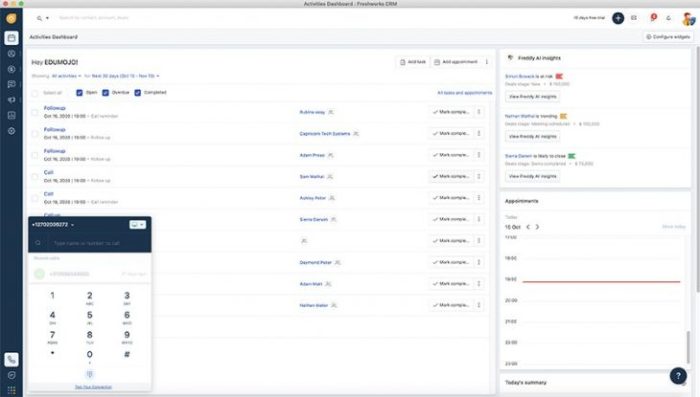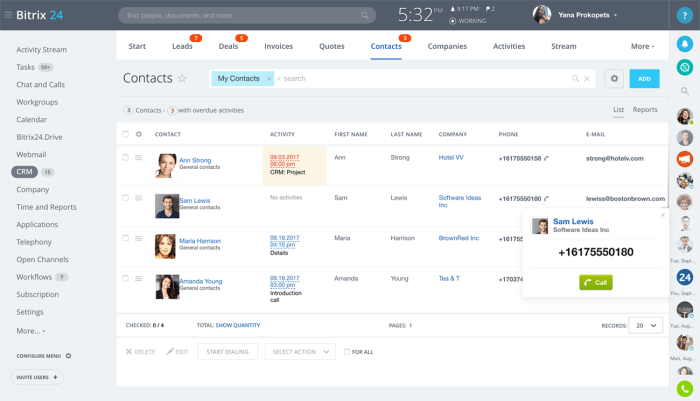In today’s competitive landscape, exceptional customer service is no longer a luxury; it’s a necessity. Businesses across all sectors are recognizing the pivotal role that a robust customer relationship management (CRM) system plays in enhancing customer interactions and driving business growth. This is particularly true for call centers, where efficient management of customer interactions is paramount. This comprehensive guide explores the intricacies of CRM call center software, its benefits, key features, implementation considerations, and the future of this transformative technology.
We’ll delve into various aspects, including call routing, agent performance monitoring, and integration with other business tools, offering a detailed understanding for both seasoned professionals and those new to the field.
Understanding CRM Call Center Software: More Than Just a Phone System
CRM call center software goes far beyond a simple phone system. It’s a sophisticated platform that integrates various functionalities to streamline and optimize the entire customer service process. It acts as a central hub, connecting agents, customers, and data to create a seamless and efficient experience. This integration allows for a 360-degree view of each customer, enabling personalized interactions and proactive problem-solving.
Key Features of Effective CRM Call Center Software:
- Call Routing and Distribution: Intelligent call routing ensures calls are directed to the most appropriate agent based on skills, availability, and customer history. This minimizes wait times and improves customer satisfaction.
- Interactive Voice Response (IVR): IVR systems automate initial customer interactions, guiding callers through self-service options and routing them to the correct department or agent. This frees up agents to handle more complex issues.
- Call Recording and Monitoring: Recording calls allows for quality assurance, training purposes, and dispute resolution. Monitoring agent performance provides insights into areas for improvement and identifies top performers.
- Customer Relationship Management (CRM) Integration: Seamless integration with a CRM system provides agents with a complete customer history, enabling personalized interactions and informed decision-making.
- Agent Performance Management: Tracking key metrics like average handling time (AHT), call resolution rate, and customer satisfaction (CSAT) scores allows for performance evaluation and improvement strategies.
- Reporting and Analytics: Comprehensive reporting and analytics dashboards provide valuable insights into call center performance, identifying trends, bottlenecks, and areas for optimization.
- Integration with other business tools: Seamless integration with other business systems like ticketing systems, email marketing platforms, and social media tools creates a holistic view of customer interactions.
- Predictive Dialer: Predictive dialers automatically dial phone numbers, maximizing agent talk time and increasing call volume. This is particularly useful for outbound call centers.
- Automated Call Distribution (ACD): ACD systems intelligently distribute incoming calls based on pre-defined rules, ensuring efficient call handling and reduced wait times.
- Real-time Chat and Email Integration: Many CRM call center solutions now integrate real-time chat and email capabilities, providing customers with multiple channels for support.
Benefits of Implementing CRM Call Center Software
Investing in robust CRM call center software offers a multitude of benefits that directly impact both customer satisfaction and business profitability. These benefits extend across various aspects of the business, from improved operational efficiency to enhanced customer loyalty.
Improved Customer Experience:
- Reduced Wait Times: Efficient call routing and IVR systems minimize customer wait times, leading to increased satisfaction.
- Personalized Interactions: Access to customer history allows agents to provide personalized and relevant assistance.
- Faster Resolution Times: Agents have access to all necessary information, enabling quicker resolution of customer issues.
- Improved First Call Resolution (FCR): Providing comprehensive solutions during the first call increases customer satisfaction and reduces call volume.
Increased Operational Efficiency:
- Improved Agent Productivity: Streamlined workflows and access to relevant information enhance agent productivity.
- Reduced Operational Costs: Automation and efficiency gains contribute to reduced operational costs.
- Better Resource Allocation: Data-driven insights enable better allocation of resources and improved workforce management.
- Enhanced Scalability: CRM call center software can easily scale to accommodate growing business needs.
Data-Driven Decision Making:, Crm call center software
- Real-time Performance Monitoring: Track key metrics and identify areas for improvement in real-time.
- Actionable Insights: Data-driven insights inform strategic decisions and optimize call center operations.
- Improved Forecasting: Accurate forecasting enables better resource planning and improved service levels.
Choosing the Right CRM Call Center Software: Factors to Consider
Selecting the right CRM call center software requires careful consideration of several factors. The ideal solution should align with your specific business needs, budget, and long-term goals.
Key Considerations:
- Scalability: Choose a solution that can adapt to your future growth and changing needs.
- Integration Capabilities: Ensure seamless integration with existing business systems.
- User-Friendliness: Opt for a user-friendly interface that is easy for agents to learn and use.
- Reporting and Analytics: Select a solution with comprehensive reporting and analytics capabilities.
- Cost and Pricing: Consider the total cost of ownership, including implementation, training, and ongoing maintenance.
- Vendor Support: Choose a vendor with a strong reputation for providing excellent customer support.
- Security: Ensure the software provider prioritizes data security and complies with relevant regulations.
The Future of CRM Call Center Software: Emerging Trends
The landscape of CRM call center software is constantly evolving, with new technologies and trends shaping the future of customer service. Artificial intelligence (AI), machine learning (ML), and cloud-based solutions are transforming the way businesses interact with their customers.
Emerging Trends:
- AI-Powered Chatbots: AI-powered chatbots are becoming increasingly sophisticated, handling routine inquiries and freeing up human agents for more complex issues.
- Predictive Analytics: Predictive analytics leverage historical data to anticipate customer needs and proactively address potential problems.
- Omnichannel Support: Integrating multiple communication channels (phone, email, chat, social media) provides customers with seamless support across all touchpoints.
- Cloud-Based Solutions: Cloud-based CRM call center software offers increased flexibility, scalability, and cost-effectiveness.
- Sentiment Analysis: Analyzing customer sentiment during calls provides valuable insights into customer satisfaction and areas for improvement.
Frequently Asked Questions (FAQ)
- Q: What is the average cost of CRM call center software? A: The cost varies widely depending on the features, number of users, and vendor. Expect to pay anywhere from a few hundred to several thousand dollars per month.
- Q: How long does it take to implement CRM call center software? A: Implementation time varies depending on the complexity of the system and the size of the call center. It can range from a few weeks to several months.
- Q: What are the key metrics to track in a call center? A: Key metrics include average handling time (AHT), call resolution rate, customer satisfaction (CSAT) scores, first call resolution (FCR), and agent occupancy.
- Q: How can I improve agent performance? A: Invest in training, provide clear guidelines, monitor performance regularly, and offer incentives for achieving targets.
- Q: What are the benefits of cloud-based CRM call center software? A: Cloud-based solutions offer scalability, flexibility, cost-effectiveness, and easy access from anywhere.
References
- Gartner (for market research and insights on CRM)
- Forrester (for market research and insights on customer service)
- Salesforce (for information on their CRM solutions)
- Microsoft Dynamics 365 (for information on their CRM solutions)
Call to Action
Ready to transform your customer service operations and unlock the full potential of your call center? Contact us today for a free consultation and discover how our expert team can help you choose and implement the perfect CRM call center software for your business needs.

Source: fitsmallbusiness.com
FAQ Section
What are the key benefits of using CRM call center software?
Improved customer service, increased agent productivity, enhanced data analysis, streamlined workflows, and better reporting capabilities.

Source: bitrix24.com
How does CRM call center software integrate with existing systems?
Integration methods vary depending on the specific software and existing systems. Common methods include APIs, custom integrations, and pre-built connectors.
What is the typical cost of implementing CRM call center software?
Costs vary widely based on features, number of users, and implementation complexity. It’s best to obtain quotes from various vendors.
How can I measure the ROI of CRM call center software?
Track key metrics like customer satisfaction, agent handle time, call resolution rates, and sales conversion rates before and after implementation.
What security measures are typically included in CRM call center software?
Robust security measures such as data encryption, access controls, and regular security updates are crucial and generally included.
